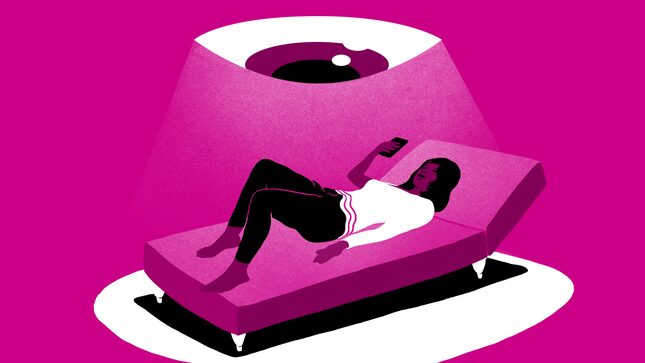The Spooky, Loosely Regulated World of Online Therapy
Like many of the businesses offering therapy online, the service promotes itself as a seamless way to access mental health services.
In Depth
Image: Jim Cooke
Starting treatment with Better Help, one of the most prominent “therapy-on-demand” apps to launch over the last few years, is easy, which is more or less the point. Like many of the businesses offering therapy online, the service promotes itself as a seamless way to access mental health services: “Message your therapist anytime, from anywhere.” For under $40 a week, a subscriber can text, call, or video chat a licensed counselor. As the company’s founder has said, one of Better Help’s central missions is to “destigmatize mental health.” To this end, it has partnered with the NBA player Kevin Love and—somewhat controversially—enlisted YouTube personalities to create sponsored content about their own depression. Late last year, noted dubstep celebrity Bassnectar donated a thousand free Better Help subscriptions to his fans.
Better Help’s users skew young and female, and it’s been downloaded nearly a half a million times in the last year, according to a mobile analytics and intelligence firm called Appfigures. Essentially, the company operates as a conduit between people looking for therapy and counselors working on a contract basis. It also operates a somewhat baffling array of websites, sorted by demographic interest, which funnel back into its telemedicine service: Pride Counseling for LGBTQ users, Faithful Counseling for those seeking therapy from a “Biblical perspective,” and Teen Counseling for, well, the teens. All of these divisions are advertised as “100% private,” operating in accordance with HIPAA, the suite of regulations guarding medical data. But as with many of the endlessly iterating companies that generate the vast ecosystem of health technology, how “privacy” applies when it comes to making consumers out of patients is a more fluid issue.
In order to understand how Better Help handles its users’ data, we signed up for the service and monitored what kinds of information it was collecting and sending elsewhere. According to the company, the platform encrypts information shared with therapists, and the licensed counselors that contract with the service are prevented by the regulations of their profession from sharing information about patients, unless there is a risk of physical harm. But as we found when we monitored the app, the realities of advertising on the internet, and the web of third-party services apps like Better Help tend to use, means some sensitive information does end up being shared—all with the ostensible goal of better tracking user behavior, and perhaps giving social media companies an easy way to see who’s feeling depressed.
A company automatically telling Snapchat and Pinterest you’re signing up for therapy still feels pretty spooky
Of all the information the average internet user shares with the technology companies that dominate their lives, health data—and especially mental health data–is some of the most valuable, and controversial: Though social media conditions a person to share every aspect of their being, at every moment, a company automatically telling Snapchat and Pinterest you’re signing up for therapy still feels pretty spooky, even if it’s covered in the fine print. It also brings up questions about how a person’s intimate, supposedly private sessions might be exploited by advertisers, an industry that isn’t exactly known for operating in good faith. And while there’s no reason to believe the information Better Help is collecting will be weaponized, there is still some stigma in struggling with mental health. Insurance companies and employers are barred by law from discriminating against people based on their mental health histories; that doesn’t mean they always follow the rules. It all depends on how much you trust the company with the information you’re feeding it: In this case, an app developed by an Israeli serial entrepreneur who is quick to note he is definitely not a medical professional, nor is he pretending to be.
On one hand, this is how the internet works now. When we brought our concerns to Better Help the company essentially brushed them off, telling us their methods were standard and that they “typically far exceed all applicable regulatory, ethical and legal requirements.” And it’s true: There are no laws against a therapy app telling Facebook every time a person talks to their therapist, or sharing patients’ pseudo-anonymous feelings about suicide with an analytics company that helps clients measure how “addicted” users are to an app. But it is a particularly stark illustration of how limited medical privacy regulations are in the expanding world of online health. Unless the people who trust Better Help deftly analyze the fine print, they might not have much of an idea of how far their intimate information is traveling, in a way that’s designed to make companies bigger and richer while patients become more easily gamed.
-

-

-

-

-

-

-

-

-

-

-

-

-

-

-

-

-

-

-

-

-

-

-

-

-

-

-

-

-

-

-

-

-

-

-

-

-

-

-

-








































